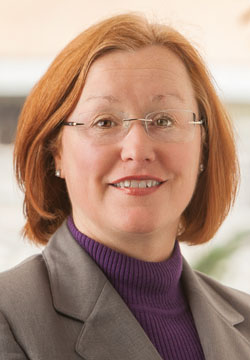 |  |
Steven Remmenga, M.D. | Kerry Rodabaugh, M.D. |
There are slightly more than 700 active American College of Obstetricians and Gynecologists-approved gynecologic oncologists in the nation, and of these, only five are located in the state of Nebraska. Two of those five — Steven Remmenga, M.D., and Kerry Rodabaugh, M.D. — practice at UNMC and the Olson Center for Women’s Health.
Drs. Remmenga and Rodabaugh are just two of a team that diagnoses and treats gynecological cancers at UNMC and the Olson Center.
The team consists of:
- Dr. Remmenga, a board-certified gynecologic oncologist with specialty training in the areas of gynecology, oncology, Da Vinci and traditional surgery, chemotherapy and research.
- Dr. Rodabaugh, a board-certified gynecologic oncologist with specialty training in the areas of gynecology, oncology, Da Vinci and traditional surgery, chemotherapy, and research. Dr. Rodabaugh is board certified in Palliative Care and also holds a strong interest in cancer genetics.
- Robert Thompson, M.D., a board-certified radiation oncologist. His clinical and research interests include interstitial implants of the endometrium and cervix.
- Andrew Wahl, M.D., a board-certified radiation oncologist. His clinical and research interests include gynecological oncology, stereotactic radiosurgery and brachytherapy.
- Subodh Lele, M.D., a board-certified gynecologic pathologist specially trained to diagnose gynecologic cancers.
- Leslie Collins an oncology nurse with specialized training and experience in managing chemotherapy and radiation treatments and their side effects.
- Pamela Nielsen, an oncology nurse with specialized training and experience in managing chemotherapy and radiation treatments and their side effects. Nielsen also develops and manages the clinical trials for gynecologic cancer patients.
On the final day of National Gynecologic Cancer Awareness Month, The Olson Center for Women’s Health offers these reminders about gynecological cancer.
According to the American Cancer Society:
- 91,730 women will be diagnosed with a gynecological cancer this year.
- More than 25,000 women will die from a gynecological cancer this year.
- All women are at risk of contracting a gynecologic cancer, but these risks increase with age.
- Early diagnosis and treatment are the best options for women diagnosed with these cancers.
There are five main types of gynecologic cancers:
- Cervical.
- Ovarian.
- Uterine.
- Vaginal.
- Vulvar.
Warning signs of gynecological cancer include:
- Abnormal vaginal bleeding or discharge.
- Pelvic pain or pressure.
- Bloating.
- Changes in bowel or bladder habits.
If any of these symptoms last for two weeks or longer, contact a doctor.